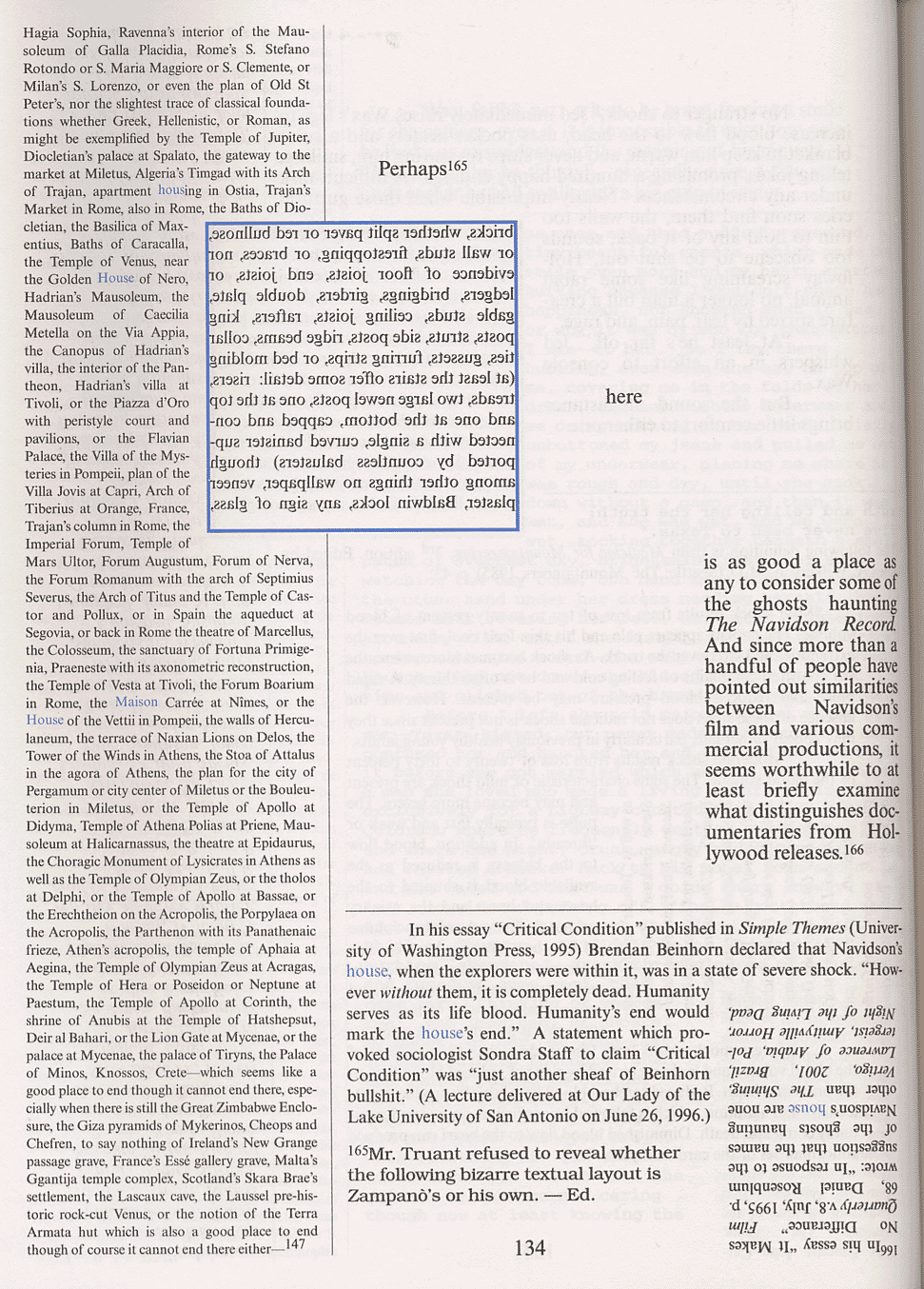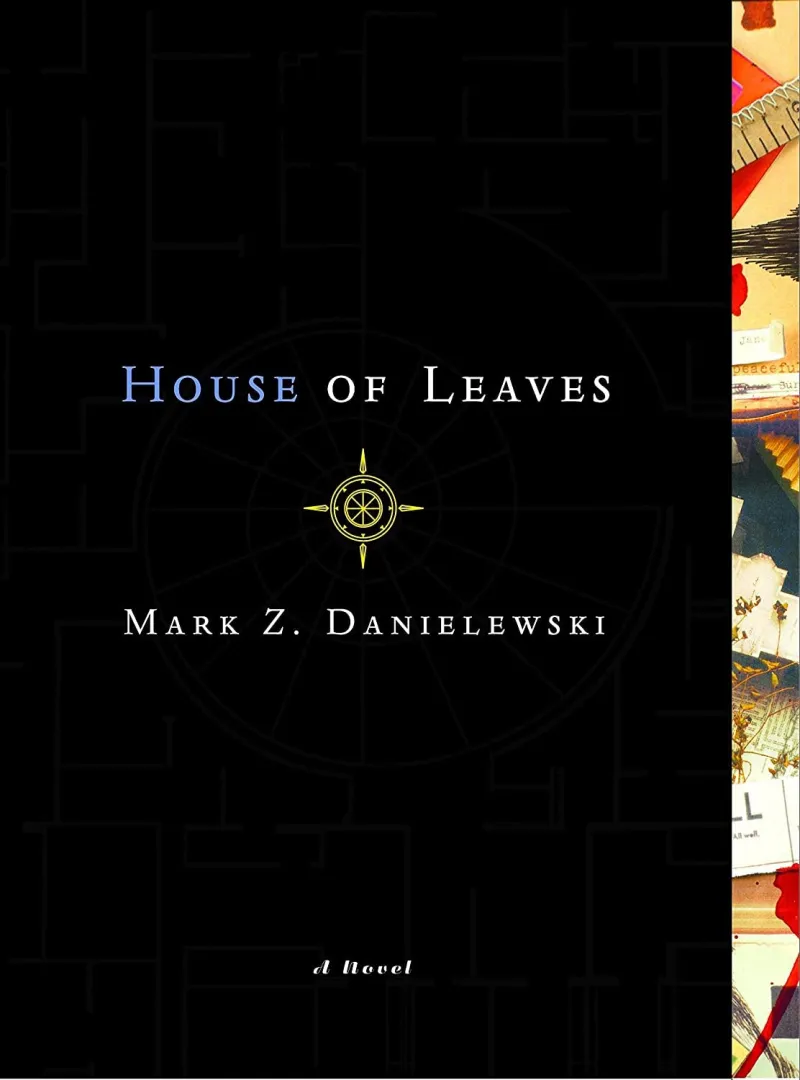An overview of
House of Leaves
by Mark Z. Danielewski
2.Pantheona
a.2000
House of Leaves summarized (in two sentences or less)
A labyrinthine novel that turns the horror of a shifting, mysterious house into an exploration of obsession, love, and the nature of storytelling. It's the literary equivalent of trying to assemble IKEA furniture in the dark and under duress, without the manual, after ingesting peyote.
House of Leaves Trivia and/or (Un)fun Facts
Echolocation: The novel’s title, "House of Leaves," is said to be a play on the concept of echo’s leaves. Danielewski is giving a nod to the myth of Echo and Narcissus, further entangling the story's narrative threads.
The Five and a Half Minute Hallway: The book was initially released in part as a sort of "viral marketing" campaign. One chapter, "The Five and a Half Minute Hallway," was released as a standalone story before the book's publication, generating buzz that's as mysterious as the hallway itself.
Family Affair: The author's sister, Anne Danielewski, known professionally as Poe, released an album called "Haunted" that serves as a sort of companion to "House of Leaves." The two even toured together to promote their respective works.
Danielewski's Tattoo: Mark Z. Danielewski has a tattoo of a leaf on his hand, which fans speculate is related to the book.
Why House of Leaves Is Challenging
The book is a labyrinth of footnotes, appendices, colored text, and typographical tricks.
It's also a love story.
And a horror story.
And a story about a documentary about a house that's bigger on the inside than it is on the outside.
And a story about a guy who's writing a book about a documentary about a house that's bigger on the inside than it is on the outside.
And a story about a guy who's reading a book about a guy who's writing a book about a documentary about a house that's bigger on the inside than it is on the outside.
And he's going crazy.
Why House of Leaves Is Worth Reading
Beyond its typographic gymnastics, the coolest thing has to be its labyrinthine structure that mirrors the story's central maze. The book doesn't just tell you about a disorienting, ever-changing labyrinth; it makes you feel like you're navigating one. It's a psychological rollercoaster that blurs the line between reader and character.
Who House of Leaves Is For
Thrill-Seekers: If you love horror, suspense, or anything that gets your heart racing, this book's labyrinthine twists will keep you on the edge of your seat.
Puzzle Masters: If you get a kick out of solving intricate puzzles, the book's complex structure and layered narratives are your playground.
Metafiction Maniacs: If you're into stories that are self-aware, that break the fourth wall, and make you question the nature of storytelling itself, welcome aboard.
Psychological Explorers: If you're fascinated by the human psyche, the book's exploration of fear, obsession, and identity will give you plenty to chew on.
Literary Adventurers: If you're not afraid to venture into unconventional storytelling formats and experimental literature, this is your next expedition.
Footnote Fans: If you love diving into footnotes, appendices, and multiple layers of text, you'll be like a kid in a candy store.
What House of Leaves Looks Like

House of Leaves, p.134
How to Read House of Leaves
Two Bookmarks: Trust me, one for where you are in the main story and one for the footnotes. You'll thank me later.
Slow Down: This isn't a book you speed-read. With all the footnotes and format changes, take your time to soak it all in.
Take Notes: Scribble in the margins, underline stuff, or keep a separate notebook. There are layers upon layers here, and jotting down your thoughts can help untangle the web.
Multiple Passes: You might want to read certain sections or even entire chapters again to catch details you missed the first time. It's like watching a Christopher Nolan movie; you'll always find something new.
Internet is Your Friend: But only after you've read it. There are tons of forums and discussions that can offer explanations for some of the book's more perplexing aspects.
Read Aloud: Some parts, especially the mirrored or rotated text, are easier to understand when heard rather than read.
Physical Copy > Digital: Seriously, this book loses its impact in digital format. You'll want to flip back and forth, and that's easier with the book in your hands.
Mind the Colors: The color-coded words aren't just for show; they've got meaning. Keep an eye out for them.
Set the Mood: A book this creepy deserves the right atmosphere. Dim lighting, quiet room—make it an experience.
Take Breaks: Don't be a hero; it's a heavy read. Take breaks to digest what you've read before diving back in.
Discussion Questions about House of Leaves
House of Leaves Research Prompts for Postdocs:
-
The book touches upon theories of quantum mechanics and relativity as it deals with the ever-changing dimensions of the house. How does Danielewski use scientific paradigms to underpin the existential horror in the story? Is the house a metaphor for the uncertainties and complexities of the quantum world?
The novel is often considered a commentary on the act of storytelling and the unreliable nature of narrators. How do Johnny Truant and Zampanò complicate the reader's understanding of what's "real"? What does this say about the relativity of truth in postmodern literature?
The novel delves into themes of trauma, fear, and the uncanny. How does Danielewski employ psychoanalytic theory, particularly the works of Freud and Lacan, to explore the psychological depths of his characters? Are the horrors of the house a manifestation of internal psychological states?
House of Leaves Conversation Starters for Normal People:
- The book has different narrators and storytelling formats, like footnotes and sideways text. How do these unique elements affect your experience as a reader? Does it make the story more engaging or confusing?
Multiple narrators give us different pieces of the puzzle. How does having different perspectives affect your understanding of the story? Do you trust one narrator more than the others?
There's a lot of talk about fear and what scares us. Which aspects of the story did you find the most terrifying and why? Do you think the book taps into universal fears or is it more individual?
Questions about House of Leaves that you can ask your dog:
- Johnny finds a very big, strange book. Have you ever found something surprising? What was it?
In the story, the house has a hallway that wasn't there before. What would you do if you found a new room in your house? 🚪
In the book, there is a big, empty room inside a house. What do you think you would find in a big, empty room? Would you be scared or excited?
The Most Amusing House of Leaves Review I Can Find
Totally infuriating. It made me feel dumb, bored, and annoyed all at once. If I want that, I'll date my first boyfriend again.
★☆☆☆☆
—Sarah via Goodreads
—Sarah via Goodreads
